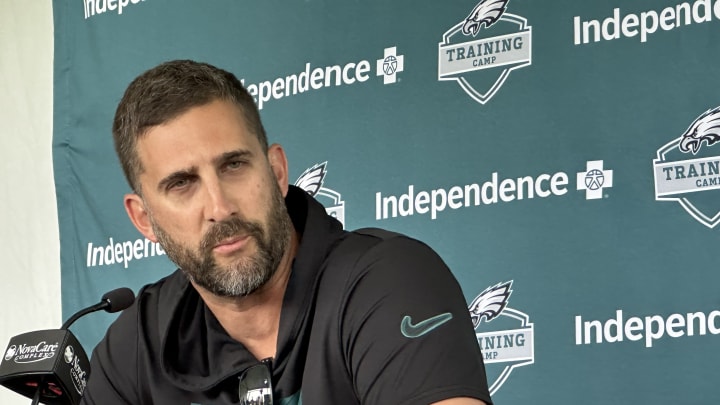Eagles' Coach Searching For His 'Sweet Spot' With Accountability

PHILADELPHIA - From his new “30,000-foot view” Eagles head coach Nick Sirianni has spent a lot of time talking about accountability and why that’s so important in life, never mind football.
Set to enter his fourth season as the on-field leader in Philadelphia, Sirianni will arrive in Sao Paulo, Brazil on Sept. 6 with immense expectations, not only for his team but also for himself.
When owner Jeffrey Lurie weighed the path forward after a historic collapse at the end of the season, Sirianni’s mulligan came with a directive on sideline behavior that was often viewed negatively from the outside.
“I think, first of all, one of the aspects that makes Nick really good is he's authentic. He doesn't hold back,” Lurie said back in March. “That also can be a negative at times. On the sideline, you don't want to infuriate the referees.
“I worry about, I want the referees to give us a fair shake. I don't want him to overreact. But I love his passion. So, I think he recognizes that it can be a little bit counterproductive if he overdoes his own passion.”
Yet Lurie also believes passion is one of Sirianni’s strengths as a coach.
“You don't want to stop where that passion is coming from,” said Lurie. “... You've got to find a sweet spot. I think he wants to find a sweet spot of what that looks like. I love his passion."
Talk about threading the needle.
Sirianni was reminded of Lurie’s sentiments this week and asked how the coach has handled the tightrope he’s been asked to traverse. The coach again brought up accountability.
“The moment we stop growing and trying to grow in our profession and grow as people, as players, as coaches is the moment you might as well not be doing it anymore,” Sirianni said. “So we're constantly trying to evolve everything that we do to -- you go through adversity and you think about “what can I do better in adversity. You go through good times and you think about 'what can I do better?'
"Everything is always in a constant evaluation of yourself. That's accountability.”
After any game, Sirianni has never been one to use the crutch of officiating. In the moment, however, he’s often shown visible frustration and is working on tempering that default setting.
“I was reading a leadership book this off-season was if you want everyone around you to have accountability and you want yourself to have accountability, then you fussing at the refs is not -- it's almost like, ‘hey, this happened, so I'm going to blame that,’” Sirianni said.
“When I read that, I was like, yeah, that hit me some sort of way," he continued. "When I think about me with a referee potentially on the sideline and I complain about a call, is that really sending the right message to the rest of the team as far as our accountability goes? Again, when something goes wrong, the answer should be how do we fix this and what are the solutions, as opposed to looking for a scapegoat.”
Ironically, Sirianni has always coached that way but the perception in some quarters had questioned that reality because of the overly-passionate behavior in the moment.
Perhaps, Dom DiSandro in his elevated role of "gameday coaching operations" can be the dampener Sirianni needs on the sideline or perhaps the coach has figured it out for himself.
“I'll be a work in progress until I'm done coaching, until I die, I feel like, just because that's just what I've always been taught,” Sirianni said. “You're always striving to get better at everything that you do.
